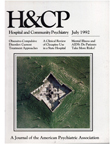Knowledge About and Risk Factors for AIDS in a Day Hospital Population
Abstract
The results of this study, like those of the study by Sacks and associates (4), suggest that patients with severe mental illness are at high risk of contracting and spreading HIV. The first step in addressing the problem is aggressive education; the provision of direct and concrete information is particularly important for patients who have not completed high school. In addition, patients' personal risk status, their level of concern about the illness, and their ability to implement the health practices they have learned should be assessed. Clinicians should take an active role in facilitating the use of appropriate medical and social resources and should continue to investigate the relationship between knowledge and behavior.
Access content
To read the fulltext, please use one of the options below to sign in or purchase access.- Personal login
- Institutional Login
- Sign in via OpenAthens
- Register for access
-
Please login/register if you wish to pair your device and check access availability.
Not a subscriber?
PsychiatryOnline subscription options offer access to the DSM-5 library, books, journals, CME, and patient resources. This all-in-one virtual library provides psychiatrists and mental health professionals with key resources for diagnosis, treatment, research, and professional development.
Need more help? PsychiatryOnline Customer Service may be reached by emailing [email protected] or by calling 800-368-5777 (in the U.S.) or 703-907-7322 (outside the U.S.).



